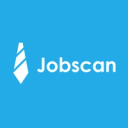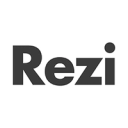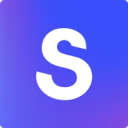The Best AI Job Search Tools (in 2026)
We analyzed 53 AI job search tools and selected the top platforms that help streamline your job hunt, optimize applications, and land more interviews.
Finding relevant job opportunities and getting your application noticed feels like searching for a needle in a digital haystack. Between scanning countless job boards, customizing each application, and wondering if your resume even made it past the ATS, the traditional job search process drains countless hours with uncertain results.
After extensively testing dozens of AI-powered job search tools in 2025, we've identified the most effective options to streamline your search and boost your chances of landing interviews.
Quick look: The 8 best AI Job Search Tools
 Teal Resume Builder Best for streamlining active searchesSee Tool
Teal Resume Builder Best for streamlining active searchesSee Tool Kickresume Best for crafting polished resumesSee Tool
Kickresume Best for crafting polished resumesSee Tool Final Round AI Best for mastering interviewsSee Tool
Final Round AI Best for mastering interviewsSee Tool Resume Worded Best for analyzing resumesSee Tool
Resume Worded Best for analyzing resumesSee Tool
What makes the best AI Job Search Tools?
Here's what we assessed to find the most effective AI job search tools:
- Optimization: Advanced AI algorithms scrutinize resumes and applications against ATS requirements, improving match rates through targeted keywords and formatting. The best tools consistently help applications clear automated screening systems.
- Efficiency: Each platform demonstrates clear time-saving capabilities through automation of repetitive tasks. Top performers cut application time by 50% or more while maintaining quality.
- Success Rate: Application-to-interview conversion metrics reveal how effectively tools help users land opportunities. Leading solutions achieve significantly higher callback rates compared to manual applications.
- User Control: The interface provides granular control over automation and customization. Standout tools balance AI assistance with user oversight, letting job seekers maintain their authentic voice.
The best AI Job Search Tools at a glance
| Tool | Best For | Standout Features | Pricing |
|---|---|---|---|
| Teal Resume Builder | Streamlining Active Searches | Integrates resume tailoring & job tracking. | Generous free plan; paid option available. |
| Kickresume | Crafting Polished Resumes | AI writing with professional templates | Free plan; Premium from $19/month |
| Jobscan | Tailoring resumes to postings | Resume vs. job description scanning. | Limited free scans; paid monthly subscription. |
| Rezi | Improving ATS Resume Scores | Real-time resume scoring feedback | Offers free, paid, lifetime access |
| LazyApply | Scaling Job Applications | Automated applications across job boards. | Offers subscription plans and lifetime access. |
| Final Round AI | Mastering Interviews | Real-time interview copilot feedback. | Expensive subscription; no free trial. |
| Sonara | Automating Your Job Search | Intelligent job matching and auto-applying. | Premium subscription up to $80/month. |
| Resume Worded | Analyzing Resumes | Instant resume/LinkedIn scoring feedback. | Limited free plan, Pro ~$19 monthly. |
Best AI Job Search Tool for Crafting Polished Resumes
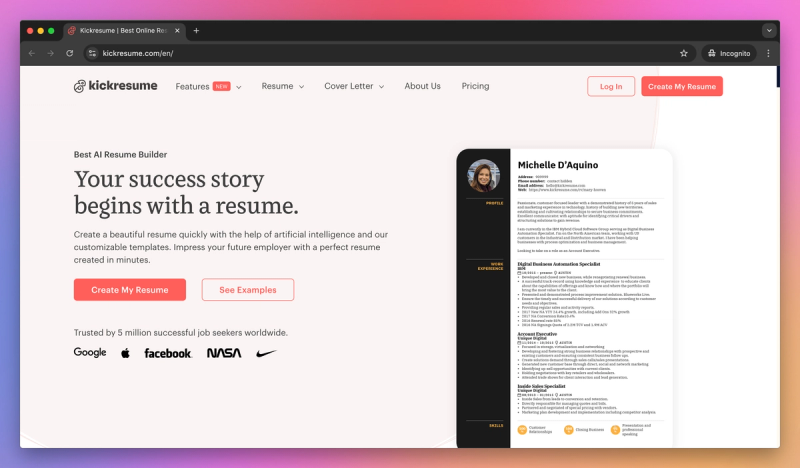
Kickresume
Kickresume is a widely-used platform trusted by over 6 million job seekers that leverages AI to craft impressive resumes and cover letters in a flash. Its value lies in combining beautiful, recruiter-approved templates with AI-generated writing. In seconds, the tool can produce a polished resume draft, helping you save time while still ending up with a professional-looking document. By streamlining resume creation and even offering one-click personal portfolio sites, Kickresume aims to make your job application process faster and more effective.
Pros:
- Time Savings: Kickresume's AI produces a full draft resume very quickly, letting you go from nothing to a professional document in a short session
- Professional Templates: The platform's design strength is a big draw, offering templates that give an automatic facelift to your information
- AI Writing Assistance: The combination of AI writing and customization is powerful, handling challenging wording while you retain control
- Integrated Convenience: Having resumes, cover letters, a website builder, and a checker in one place provides a convenient hub
Cons:
- Limited Free Plan: The free version is restricted, offering only 4 basic resume and cover letter templates
- Potential for Generic Content: Because the AI generates content based on common patterns, the output can sometimes feel formulaic
- Mobile App Limitations: While a mobile app exists, it lacks some advanced functionalities found on the desktop version
Best Use Cases
- Quickly Creating Polished Documents: Ideal when you need a high-quality resume and cover letter swiftly without being a design or writing expert
- Drafting Tailored Applications: Speeds up the process of drafting new, tailored versions of your resume and cover letter for different job applications
Best AI Job Search Tool for Streamlining Active Searches
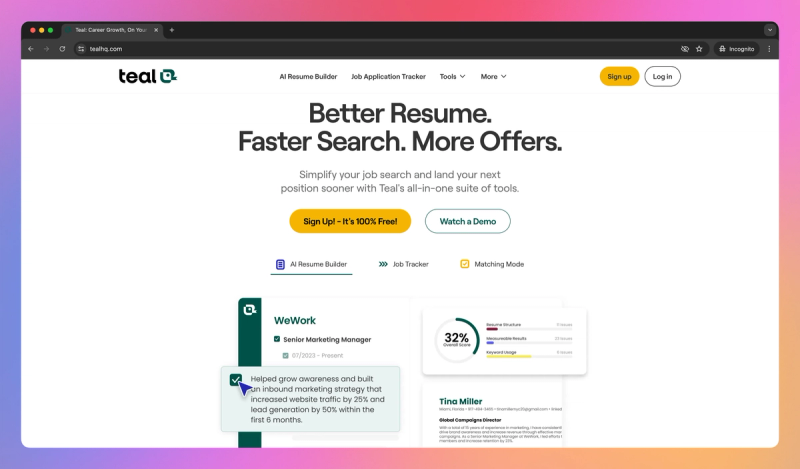
Teal Resume Builder
Teal Resume Builder serves as an all-in-one “career copilot” platform designed to help you organize and optimize your entire job search process using AI. Its core value lies in enabling you to tailor each resume specifically for the job you’re applying for, thereby improving your match potential, while simultaneously helping you keep track of all your applications and offering guidance like LinkedIn profile tips. Teal effectively combines functionalities that might otherwise require multiple tools or spreadsheets into one integrated hub, aiming to save you time and increase the overall effectiveness of your job search by ensuring you send out better-targeted applications and maintain clarity on your progress. The platform's key differentiator is its seamless integration of resume tailoring—powered by machine learning suggestions aligned to job descriptions—with a robust job application tracker that includes features like reminders and communication templates.
Pros:
- All-in-One Hub: Teal centralizes everything—resume versions, application tracking, notes—replacing scattered documents and spreadsheets, which makes tailoring resumes and following up much smoother.
- Effortless Customization: Creating and optimizing multiple resume versions for different roles is incredibly efficient; you can duplicate a base resume and let the AI suggest keywords tailored to each specific job description.
- Generous Free Plan: You get significant value without paying, including unlimited resumes, the job tracker, and basic keyword matching, making it highly accessible compared to competitors who often charge for these core features.
Cons:
- AI Suggestions Need Polish: While helpful for starting points, the AI-generated content can sometimes sound generic or miss context, meaning you still need to carefully review and refine the text yourself.
- Requires Engagement: To truly benefit from Teal's full capabilities, especially the tracker and LinkedIn tools, you need to invest time setting up your profile and consistently log application details.
- Paid Tier Value: Given how much the free plan offers, the added benefits of the Teal+ subscription (like advanced analytics) might not feel essential for every job seeker.
Best Use Cases:
- Managing High-Volume Searches: Ideal when applying to numerous positions, helping keep track of each application stage, tailoring resumes efficiently, and preventing things from falling through the cracks.
- Pivoting Careers or Roles: Excellent for maintaining and optimizing different resume versions tailored to various fields or job functions, ensuring you highlight the right skills for each target.
- Organizing a Strategic Hunt: Perfect if you treat your job search like a project, needing a central command center to manage tasks, reminders, notes, and application materials methodically.
Best AI Job Search Tool for Improving ATS Resume Scores
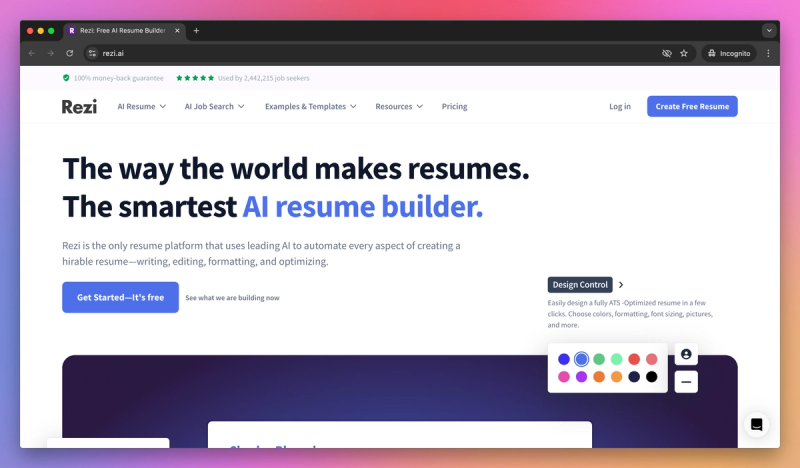
Rezi
Rezi is an AI-powered resume platform focused on helping you create resumes that beat Applicant Tracking Systems (ATS) and impress hiring managers. Its core promise is that using its tools allows you to easily produce a resume tailored with the right keywords and format, significantly increasing your chances of getting an interview by demystifying the optimization process. This platform differentiates itself through a comprehensive suite of AI-driven features, including a content writer, keyword optimizer, and ATS compliance checker, all centered around its standout Real-Time Content Analysis and Rezi Score which provides immediate feedback as you build your resume.
Pros:
- ATS and Keyword Expertise: Rezi effectively bundles knowledge of how ATS algorithms rank resumes into its suggestions, helping you insert the right terminology and avoid common pitfalls to improve match rates.
- Step-by-Step Guidance: The structured approach guides you section by section, enforcing good resume habits like quantifying achievements and using action verbs.
- Comprehensive Features: It combines a resume builder, AI writer, keyword scanner, cover letter generator, and interview prep tools, eliminating the need for multiple separate tools.
Cons:
- Limited Design Options: The templates prioritize ATS compliance over creativity, feeling somewhat rigid if you need a highly personalized layout.
- Requires Effort: It's not a one-click solution; you need to actively engage with the feedback and iterate on your content.
- Potential Over-Optimization: Focusing too heavily on the score or keyword suggestions risks creating an overly robotic resume.
Best Use Cases:
- Data-Driven Optimization: Ideal if you like using scores and checklists to ensure your resume meets ATS requirements.
- Diagnosing Resume Issues: Excellent for figuring out why your current resume isn't getting traction.
- Refining Resume Content: Perfect for meticulously optimizing your resume content for specific job applications.
Best AI Job Search Tool for Tailoring Resumes to Postings
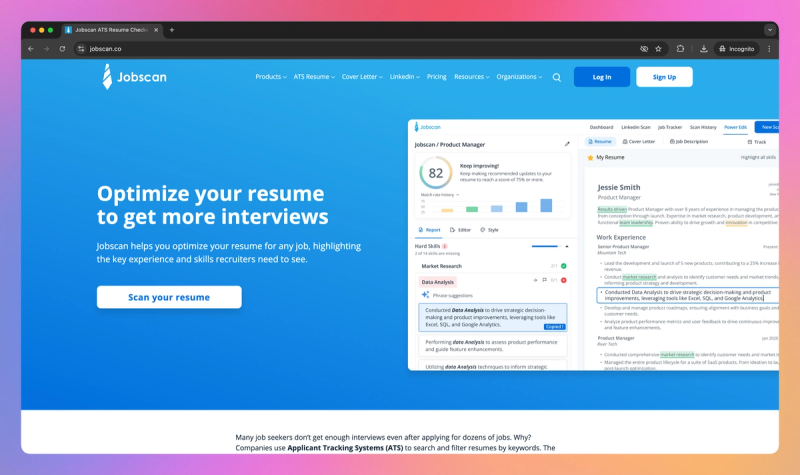
Jobscan
Jobscan is a specialized tool designed to boost your resume’s alignment with specific job postings, particularly to get through Applicant Tracking Systems (ATS). Its core proposition is simple but powerful: paste in your resume and a job description, and it will tell you how well they match and how to improve that match. In a job market where ATS software often filters resumes before a human ever sees them, this tool enables you to understand exactly what those systems are looking for and adjust accordingly. Essentially, it takes the guesswork out of tailoring a resume for each application by providing a data-driven comparison, helping your resume rank higher in recruiters’ searches.
Pros:
- Demystifies ATS: Gives immediate clarity on why an Applicant Tracking System might not favor your resume, turning rejections into actionable steps based on data-driven insights.
- Quick and Easy Analysis: The interface is straightforward – paste text, scan, and get detailed, color-coded results in seconds, providing a fast audit of your resume's alignment.
- Trusted Standard: Recommended by career coaches and used by over 1 million job seekers, Jobscan is seen as the standard for ATS optimization, lending credibility to its analysis.
- Boosts Interview Chances: By helping you better reflect job requirements, your resume is more likely to catch a recruiter's eye, significantly improving callback rates according to many accounts.
Cons:
- No Guarantee: A high match score doesn't ensure an interview; over-optimizing for the score might make a resume sound robotic and overlook other hiring factors.
- Cost and Limits: The free version offers limited scans (around 5 per month), and the full subscription (~$49.95/month) can be expensive, especially compared to manual checks or free alternatives.
- Keyword Focus: Primarily measures keyword matches, potentially leading to keyword stuffing if followed rigidly, without directly assessing overall writing quality or nuance.
Best Use Cases:
- Targeted Job Applications: Ideal for meticulously optimizing your resume against a specific job description, especially for competitive roles or dream companies where ATS screening is likely.
- Diagnosing Application Issues: Useful if you suspect your resume isn't getting past initial screens, helping identify missing keywords or formatting problems that might be causing rejections.
- Learning ATS Best Practices: Acts as a learning tool to understand which keywords and phrasing are valued for roles in your field, helping you improve your general resume quality over time.
Best AI Job Search Tool for Analyzing Resumes
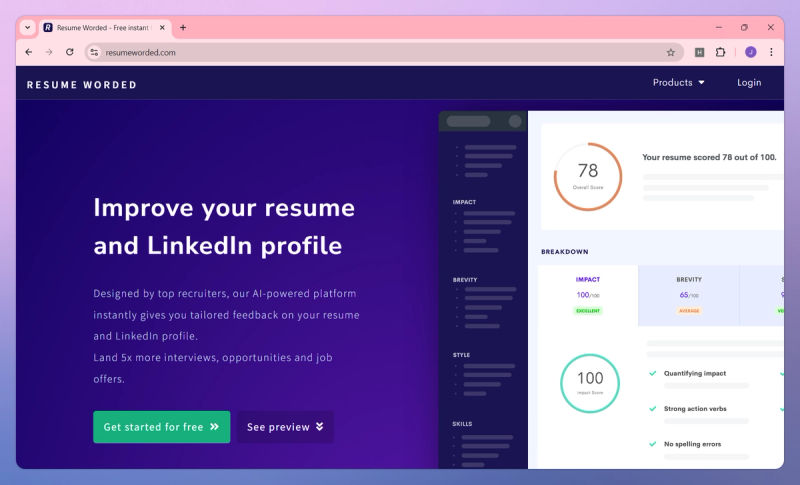
Resume Worded
Resume Worded serves as a career coach providing instant, actionable feedback on your resume and LinkedIn profile. Unlike tools that build or heavily edit your documents, its primary value is in analyzing what you already have and pointing out what can be improved to increase your chances of getting noticed. It essentially helps answer the questions: “Is my resume any good? If not, why, and how can I make it better?” and “Is my LinkedIn profile attractive to recruiters?”. By focusing on feedback and optimization, this tool lets you refine your applications with data-driven suggestions – like fixing vague language, adding relevant keywords, or reorganizing content for impact. The ultimate goal is to turn a decent resume into a great one, and a generic LinkedIn profile into a recruiter-magnet, thus improving your job search outcomes.
Pros:
- Fast Actionable Insights: This tool quickly highlights strengths and weaknesses in your resume or profile that might not be obvious, offering specific suggestions like including metrics or stronger action verbs. This immediate critique is eye-opening.
- Boosted Visibility: Following the suggestions helps your resume communicate value more clearly and optimizes your LinkedIn profile with keywords, potentially leading to more recruiter inquiries and profile views.
- Ease of Use: There’s practically no learning curve; simply upload your document or connect LinkedIn for instant results, making it accessible 24/7 for quick checks before applying.
Cons:
- Context Blindness: The AI feedback, while generally good, sometimes misses context, potentially suggesting irrelevant metrics or failing to recognize specific technical terms, requiring careful review.
- Generic Suggestions: Advice can occasionally feel generic (e.g., "use more action verbs"), and it might not fully grasp nuances like cultural differences in CVs or intentional creative choices.
- Cost for Full Access: While the free version is useful, especially for LinkedIn checks, unlimited resume scans and advanced features require a paid subscription, which might be a barrier for some during an active job search.
Best Use Cases
- Refining Existing Documents: Ideal for polishing an existing resume draft or LinkedIn profile, turning good materials into great ones by identifying areas for improvement in impact and clarity.
- Diagnosing Application Issues: Use it when your applications aren't getting responses to see if your resume is missing keywords, uses passive language, or has other flaws hindering its effectiveness.
- LinkedIn Profile Optimization: Essential for enhancing your LinkedIn presence, ensuring your profile uses the right keywords and structure to attract recruiters and opportunities effectively.
Best AI Job Search Tool for Mastering Interviews
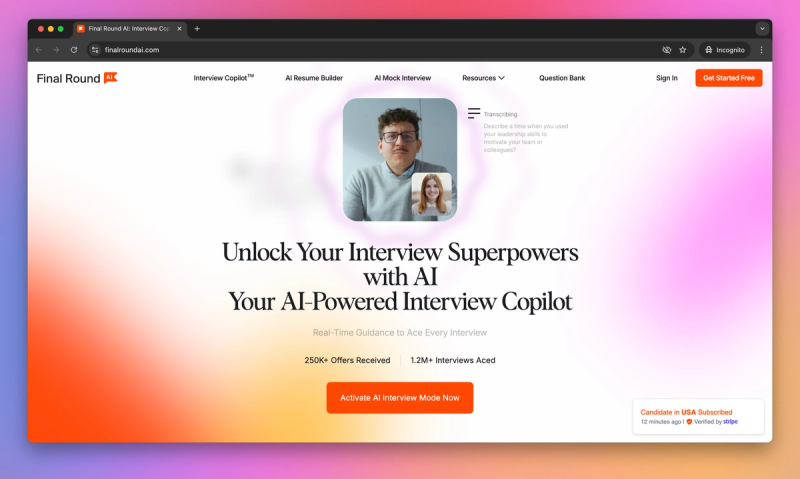
Final Round AI
Final Round AI is a cutting-edge interview preparation tool that leverages AI to simulate realistic interview scenarios and provide real-time coaching. Its main value is helping candidates practice for interviews interactively and tailorably, like having a personal interview coach available on-demand. With features like an AI Interview Copilot offering feedback on the fly and a technical interview simulator, the tool aims to substantially improve interview performance by identifying weaknesses before facing actual interviewers, trying to remove the element of surprise in interviews so you feel more confident and polished.
Pros:
- Realistic Practice: Offers practice that feels closer to the real thing, adapting to answers and providing feedback to handle unexpected questions.
- Identifies Weaknesses: Immediate feedback and analytics can reveal issues like filler words or lack of structure that you might not notice otherwise.
- Convenient & Consistent: Practice anytime without scheduling; the AI is always available, allowing repetition until you master an answer.
- Broad Content: Covers a wide range of interview types (behavioral, technical, case) with a vast question bank, preparing you for different scenarios.
Cons:
- High Cost: Operates on a premium subscription model that can be expensive, potentially inaccessible without a free trial.
- AI Limitations: May sometimes ask irrelevant questions or fail to capture human nuance, especially for niche roles or specific industries.
- Potential Over-reliance: You might become dependent on the real-time feedback and struggle without it in actual interviews if not used carefully to build habits.
Best Use Cases:
- High-Stakes Interviews: Ideal for preparing for challenging interviews at competitive companies (e.g., tech, consulting, finance) where performance is critical.
- Technical Preparation: Offers specialized practice for technical roles like software engineering, including coding simulators and system design questions.
- Confidence Building: Helps nervous interviewees desensitize themselves to pressure and identify/fix weaknesses through repeated, structured practice.
Best AI Job Search Tool for Scaling Job Applications
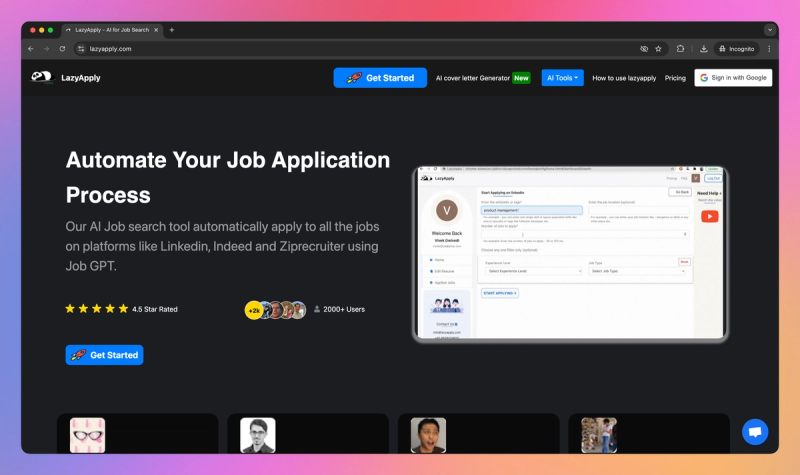
LazyApply
LazyApply is designed to automate and massively scale the job application process. Instead of manually applying job after job, which consumes countless hours, this tool applies to potentially hundreds of postings per day across platforms like LinkedIn and Indeed with minimal effort from you. By embracing a volume strategy, LazyApply aims to increase your odds of getting responses simply by casting a wider net, making it useful when qualifications are relatively standard and the goal is maximum exposure. It interfaces with multiple job boards using a browser extension, automatically filling forms and uploading resumes, turning hours of repetitive work into a background process.
Pros:
- Massive Time Savings: Automates the incredibly time-consuming task of filling out hundreds of application forms, freeing you up for interview prep or targeted applications.
- Increased Exposure: Applying to significantly more jobs increases the probability of landing interviews through sheer volume, helpful for quickly finding opportunities.
- Focus Allocation: Lets you delegate the high-volume, less tailored applications, allowing you to concentrate manual effort on applications for high-priority roles.
Cons:
- Lower Success Rate Per Application: The "spray and pray" approach often means applications aren't well-tailored, potentially leading to lower response rates compared to personalized applications.
- Application Errors and Irrelevance: Automation can fail on complex forms or apply to unsuitable jobs if filters aren't precise, wasting effort and potentially leading to awkward recruiter interactions.
- Platform and Reputation Risks: Automated high-volume applications might violate job board terms of service, risking account flags, and recruiters may disregard obviously non-personalized applications.
Best Use Cases:
- Maximizing Reach Quickly: Ideal when you need to apply to a large number of positions rapidly, such as recent graduates or those needing employment urgently, prioritizing volume over deep personalization.
- Supplementing Targeted Efforts: Use it to handle applications for a broad range of potential fits while you manually craft high-quality applications for your top-choice roles or companies.
- Applying While Busy: Perfect if you're currently employed or otherwise short on time, letting the tool handle the bulk of applications in the background.
Best AI Job Search Tool for Automating Your Job Search
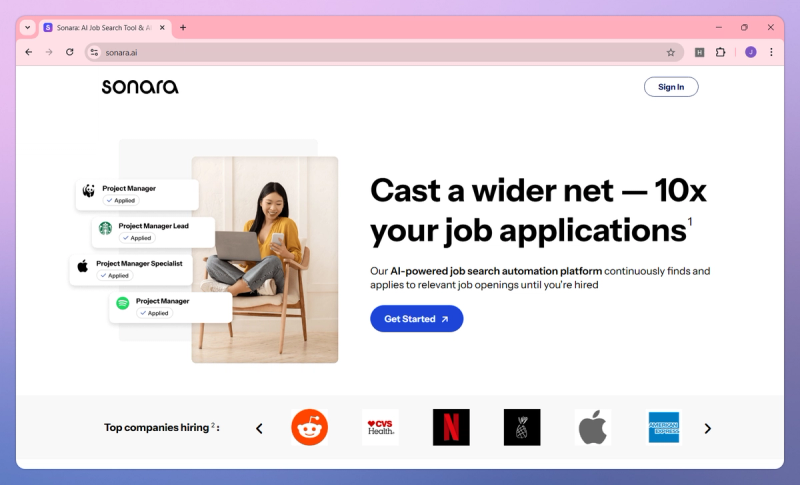
Sonara
Sonara presents itself as an AI-driven job search agent that actively finds job openings matching your profile and preferences, then applies to them automatically. It aims to be an intelligent autopilot for your job hunt, scanning millions of postings to identify roles that fit your experience and handling the application process. This approach can expand your opportunities beyond manual searches, potentially uncovering roles you might otherwise miss, all while saving significant time. The platform's promise is essentially finding potential jobs while you sleep, streamlining the search with hands-off automation.
Pros:
- Significant Time Savings: Sonara automates both job searching and applying, freeing up hours daily and reducing the mental load of the job hunt.
- Passive Search Convenience: Ideal if you're employed or not actively looking; the tool keeps your hat in the ring for relevant opportunities without requiring constant effort.
- Modern Interface: Features a polished dashboard for tracking applications and managing the automated process, providing clear oversight.
Cons:
- Inconsistent Matching: The AI doesn't always get it right, sometimes applying to irrelevant jobs or missing good fits, undermining the core value.
- Technical Issues: A noticeable percentage of applications may fail due to glitches like inability to handle email verifications or ineffective filters, requiring manual follow-up.
- Premium Price Tag: With costs reaching up to $80/month, the service is expensive, and the return on investment isn't guaranteed, especially given the potential for errors.
Best Use Cases:
- Automating Passive Searches: If you're employed but open to offers, Sonara can maintain your market presence by finding and applying to suitable roles automatically.
- Broadening Opportunity Discovery: Use Sonara to uncover relevant job postings beyond your usual search scope or network, expanding your potential options.
Conclusion
Modern AI job search tools are transforming how people find work by automating tedious tasks and optimizing application materials. From resume builders that beat ATS systems to interview practice platforms offering real-time feedback, these solutions tackle specific pain points in the hiring process. The result is a more efficient and effective job search, giving candidates back valuable time while improving their chances of success.
